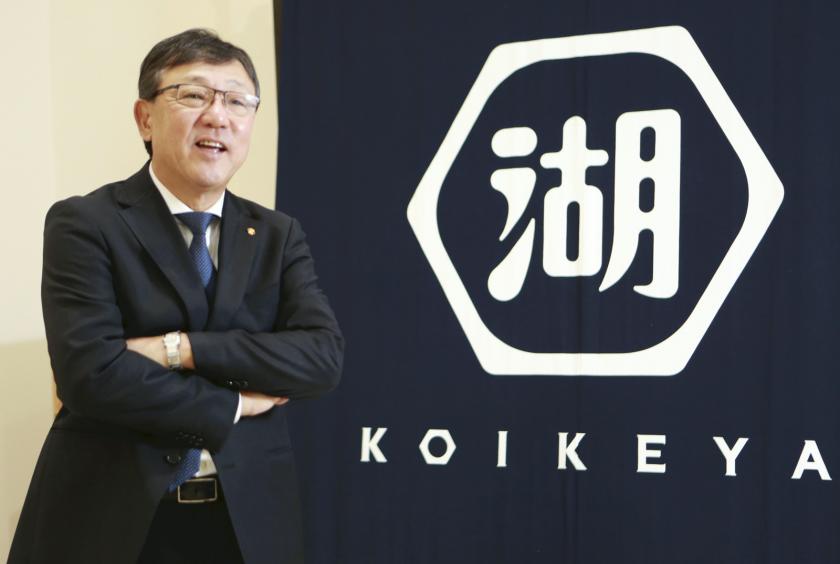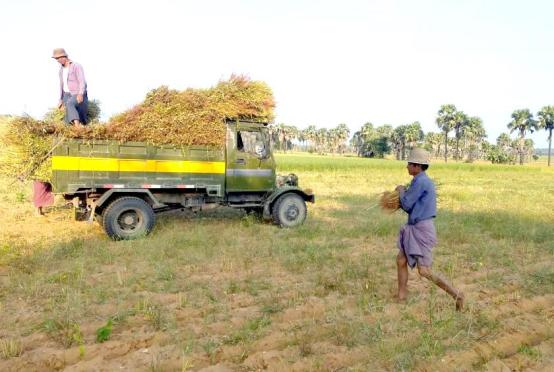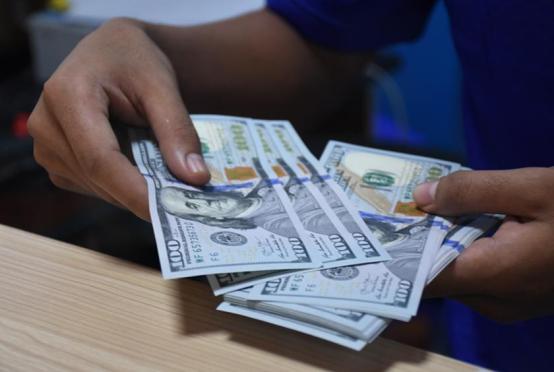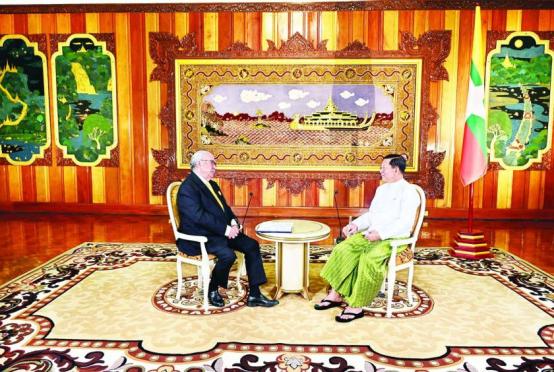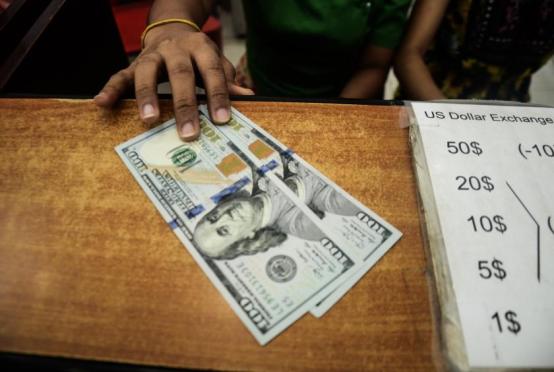Japan [The Japan News] - Koike-ya Inc. was the first company to successfully mass-produce potato chips in Japan.
The pioneer has preserved its traditions while at the same time producing a string of hit products like “Koikeya Pride Potato.” What is their secret? For this installment of Leaders, a column featuring corporate management and senior executives, President and COO Akira Sato explains his objectives and strategy to The Yomiuri Shimbun.
Though people tend to have their favourites, they still unconsciously anticipate finding something new when they go grocery shopping. Consumers decide what to buy in two seconds. The decision is made instantaneously.
What’s needed to win over the consumer is, first and foremost, to create an expectation in them through such means as packaging and advertising. This is called "perceived quality," and it has to be high. For this reason, we take exceptional care with packaging.
On top of that, the expectation must also be accompanied by actual quality in terms of taste and other factors. If there is a huge difference between the perceived and actual quality, people will never buy your product again. This is a competitive business. If they are satisfied, they will continue to buy it.
Adjusting to the changing times is also important. These days, long-selling products are struggling to survive in the industry. Branding is important, but simply remaining in the market is not enough. It is necessary to always be responsive to the interests and expectations of customers.
[Koikeya Pride Potato, which went on sale in February 2017, is sold at shops for around ¥150. Although about ¥30 more expensive than conventional products, it earned ¥4 billion in sales in the business year after it debuted — double the initial target.]
Pride Potato was developed to meet the demand of consumers looking for "a high-quality rather than high-quantity product," or "a casual present to give to the grandchildren." In response to increasing health consciousness, we use no flavour enhancers or similar ingredients.
The "Onehand" series of potato snacks, released in May 2018, was born out of a conversation with the president of a distributor. The president requested a new type of product, telling me, "I want you to crush potato chips in the bag into small pieces, so I can eat them by the mouthful."
Simply crushing the chips seemed a bit wasteful. Instead, we put potato snacks in the shape of small, narrow sticks into a long, narrow bag that can be held in one hand. We explained, "You can eat them all at once this way."
"Interesting," the president said. So we decided to put it on the market. Because a growing number of people play games on smartphones or other devices, this product satisfies their desire to keep their hands from getting messy.
In addition, a product named Japan Pride Potato — which uses local ingredients and has packaging showcasing local tourist attractions such as Munakata Taisha Shrine in Munakata in the Kyushu region — has also been well received. The product also allows us to contribute to regional revitalization. Our top-class potato chips, made from a variety of Imakane Danshaku in Hokkaido — a premium potato that accounts for just 0.3 per cent of the nationwide potato supply — sold out instantly through internet preorders.
Though I myself have proposed not a few new products, I would like to further enhance the value of Koikeya’s brand by adding value from a variety of perspectives.
Canned coffee FIRE becomes hit
I previously worked for Kirin Brewery Company, where I gained experience in product development.
When I joined Kirin, I was first assigned to the sales department and put in charge of the northern Kanto region. I hopped around from store to store quite a bit, and I think I achieved fairly good results. However, when our rival released Asahi Super Dry in 1987, the business climate worsened overnight. More and more fans of Kirin were snatched away. I realized the situation was beyond my sales abilities. I requested a transfer to the product development department and got my wish.
But I could not improve things the way I expected. Unlike in the sales department, a flurry of English loan words flew about the new workplace. I didn’t have the know-how and was hard-pressed to come up with ideas for new products. It was truly a difficult time for me, and at times I even shed tears.
It was at one of those times when my boss told me: "Go to Germany. See the home of beer." When I visited the German countryside, I saw a single brewer create beer from start to finish. What I learned there is this: "Making beer is simple and ingredients are of utmost importance." I realized I could at least pass this principle on to others through my job. After the trip, I created a new premium beer: Kirin Brau Meister. Its success gave me great confidence in myself.
[Thereafter, Sato produced a series of hit products including the canned coffee drink FIRE and green tea soft drink Nama-cha at Kirin Beverage Company, Limited.]
It was probably FIRE, released in 1999, that made me known in the world of product development. At that time, salaried workers were feeling down because of a severe recession. I wanted to give them coffee along with a song to cheer them up. I asked Stevie Wonder to appear in a TV commercial for us. He flatly turned me down.
But I couldn’t give up on the idea. I wrote a letter that said: "I want to encourage struggling company employees. I’d be grateful if you’d do just a song for them." Several weeks later, I received an international call out of the blue. The caller simply said, "The song is ready."
Stunned, I flew to Los Angeles to visit the studio. Stevie said "listen" and gave me a live performance of the song. I felt goosebumps all over. It was very moving.
He eventually agreed to appear in the commercial, accepting it as part of his creative work. The commercial had a big impact and helped FIRE become a smash hit. The experience taught me that the real thing can touch people’s hearts and that you should never give up on anything. Perhaps he understood my conviction to do something for Japanese employees, rather than myself.
Exclusively from Japanese potatoes
[Sato left Kirin Beverage Company after serving as president. Responding to a request from Nissin Foods Holdings — Koikeya’s largest shareholder — he joined Koikeya in 2016.]
At the time, Kirin was pursuing globalization, and I felt the company was aiming to become more like a trading company than a manufacturer. I decided to move on because a gulf had emerged between Kirin’s future path and my desire to create things. I had wanted someday to work in food, which is inseparable from beverages. I felt the decision could lead to the completion of my life’s work.
My first task after joining Koikeya was to deal with the "potato chip shock." A typhoon struck our factory in Hokkaido and knocked out our machines. The potato fields were also hit and we had a bad harvest. We had to temporarily suspend all sales except for key products like Karamucho, a spicy potato snack, and Potato Chips Nori Shio, chips with salt and seaweed.
However, under those circumstances, I came to feel strongly that "everyone loves potato chips." The incident made me recognize anew our responsibility to supply the product.
At the same time, we started strengthening Koikeya’s brand image. Our goal is to create "Nippon Snacks," or potato chips made exclusively from Japanese potatoes. Koikeya’s potato chips — created in the Japanese way by adopting tempura frying techniques — are works of art developed by the company’s founder. I would like to live up to the brand name that so many people love. We have created a new corporate logo and put it on every single product we sell, as well as our company emblem, business cards and paper bags. Everyone in the company has joined together in the effort.
From here on, I’m considering moving beyond the world of snack foods to build a new brand that can follow Koikeya. I’m looking at the space between snacks and everyday foods. Wait until you see what we have in store.
■ Akira Sato / President and COO of Koike-ya Inc.
Born in Tokyo in 1959. Sato graduated from the School of Law at Waseda University in 1982 before joining Kirin Brewery Company. He served in various posts including director in charge of the Kyushu region. He became president of Kirin Beverage Company in 2014. Sato took the position of executive officer of Frente Co. (now Koikeya) in May 2016 before assuming his current post in September of the same year. At Kirin, Sato helped create a string of hit products while in the product development department, earning him the sobriquet "legendary hit-maker."
■ Key Numbers
18 nations, regions
Koikeya began to boost overseas operations about 5 years ago, focusing mainly on Asian markets such as Taiwan. The company currently sells products in 18 countries and regions. Overseas sales account for about 10 per cent of all sales, with the company aiming to increase the percentage. Founded in 1953, Koikeya earned sales of ¥32.2 billion according to the consolidated financial results for the business year ended June 2018. The company had 720 group employees as of the end of June 2018.
(USD 1 = JPY 109.47)

